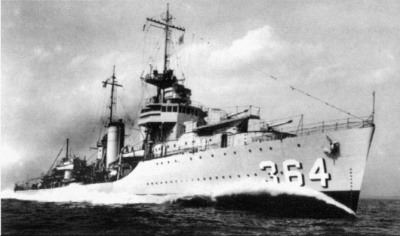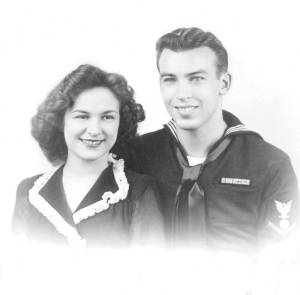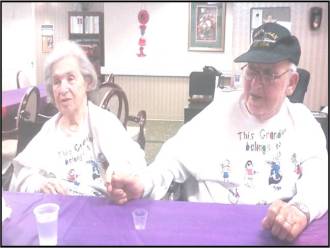Tomorrow is Veteran’s Day, and I want to take this opportunity to pay tribute to my father, Edwin McKenzie.
Dad graduated from high school in the spring of 1941 and enlisted in the U.S. Navy not long after the Japanese attack on Pearl Harbor the following December. After a few weeks of basic training in San Diego, he was assigned to the destroyer U. S. S. Mahan as an electrician’s mate and headed for the South Pacific. For the next two years he served constantly in the theater of war, taking part in the campaign for Guadalcanal, the Battle of the Santa Cruz Islands, and a variety of smaller operations around New Guinea and the Admiralty Islands.
In early 1944 Mahan was ordered back to California for overhaul and Dad was granted a thirty-day leave upon arrival. He took the train from San Diego to our little home town of Athens, Tennessee, arriving on a Sunday evening, where he was met by a host of family, friends, and Margaret Lee Hale, the woman he had proposed to countless times since leaving Athens.
My parents had met for the first time in the summer of 1937, shortly after my father’s family moved to town from California. My mom, all of twelve years old at the time, was in despair (as she told the story), because there was not a single boy in all of Athens that she was interested in marrying. That changed when she met Edwin at a town baseball game, and although she protested, she was secretly glad when her girlfriends invited him to her upcoming birthday party. Ed arrived bearing gifts—a handkerchief and Evening in Paris perfume—and won Margaret Lee’s heart.
The couple became sweethearts, and they might have gotten really serious had not war intervened. They were coming out of a movie in Chattanooga on a Sunday afternoon when they heard of the Japanese attack on Pearl Harbor. (Mom felt guilty about going to the picture show on a Sunday and feared that something bad might come of it, but she didn’t expect World War Two.) Within a few months Dad was halfway around the world in a global conflagration. Over the next two years the couple exchanged hundreds of love letters; 545 of them survived. As my dad’s leave drew near he regularly raised the prospect of marriage and my mom just as regularly ignored him. He renewed his plea almost as soon as he stepped down from the train, however, and my mom couldn’t resist. Four days later later they were married. Less than three weeks after that Dad was headed back overseas.
In the fall of 1944 Mahan was operating off the coast of the Philippines, patrolling for submarines and assisting with an amphibious landing near Ormoc Bay. On December 7, 1944—three years to the day after the attack on Pearl Harbor—three Japanese kamikaze bombers crashed into Mahan, and in short order the destroyer was in flames, one of the magazines had exploded, and a plume of black smoke was rising hundreds of yards into the air. Years later, a sailor on the U.S.S. Walke recalled the aftermath in these words:
We were heading for Mahan at high speed from about 1-2 miles away. Our Captain thought to lay us alongside to help fight fires. She was dead in the water under a huge column of black smoke. We could see flames in her bridge area. As we got closer we could see fire hoses in action. At this time our guns were firing so we did not hear, but we saw what appeared to be an explosion forward of the bridge. We were coming in on her port side when we saw her men beginning to abandon. At the same time a big raid developed and we had to pull away. During a lull in the battle, we returned to the area and began to pick up survivors. Twice we had to pull away to fight off raids, returning to pick up her people. Another destroyer was aiding in this. Some of the survivors were horribly burned and many were otherwise wounded. There was heavy fuel oil in the water and a lot of the men were sick and vomiting. I believe we got them all. . . .
Praise be to God, Dad survived the attack. Dad was willing to share that much, but no more. What he felt when he heard the crash of the Kamikazes, what he thought when the forward magazine on the Mahan exploded, what he saw as he headed toward the side, what went through his mind when he jumped into the oil-coated bay, what, perhaps, he prayed as he bobbed in the water while the battle continued to rage—these are things that Dad never once offered to share.
In a heart-wrenching “snafu,” the Navy Department inadvertently released the news of the sinking of Mahan before all of the crewmembers’ families could be notified, so my mother heard on the radio that Dad’s ship had gone down before she heard from Dad that he was OK. I cannot imagine the extremes of emotion she must have felt, although Mom always insisted that she knew in her heart that Dad would come back to her. And so he did.
My mom passed away on Christmas Eve 2011. The last picture I have of them together shows them wearing matching shirts and holding hands–seventy-three years after their first date. The picture’s a bit fuzzy, but if you but if you look closely, you may also be able to tell that my dad is wearing a ball cap commemorating the Mahan (DD-364). Next to his family, Dad’s service to his country was his greatest source of pride.
Dad passed away not quite three months ago at the age of ninety-five. Thanks for letting me tell you his story.
Eternal Father, strong to save,
Whose arm hath bound the restless wave,
Who bidd’st the mighty ocean deep
Its own appointed limits keep;
Oh, hear us when we cry to Thee,
For those in peril on the sea!






